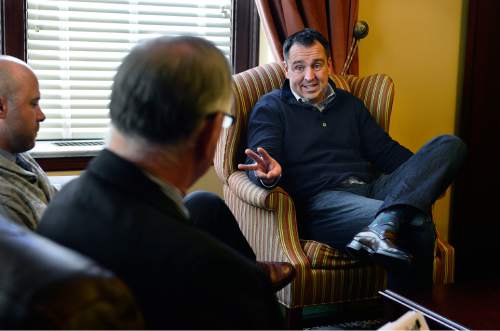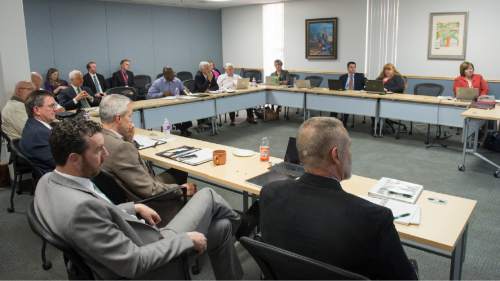This is an archived article that was published on sltrib.com in 2015, and information in the article may be outdated. It is provided only for personal research purposes and may not be reprinted.
Several current and past Utah Transit Authority leaders combined to keep the agency's direct fingerprints off a recent trip to Switzerland for public officials — after a series of trips to the same destination generated controversy.
The agency's former chairman and current Utah House speaker — not UTA itself — headed the latest Swiss trip in late September. A longtime lobbyist for UTA organized travel details. Key funding came from a political action committee created last year by two current UTA board members (whose largest donors happen to be UTA contractors).
But UTA spokesman Remi Barron said the trip "was not approved by the board, nor did the board receive notice that the trip was taking place," even though it included two UTA board members and two of its longtime lobbyists, along with several Utah politicians.
The trip stayed out of headlines before voters this year decided Proposition 1 on whether to raise sales taxes for transportation and transit. Had UTA directly organized the trip, it would have become public before the fact because the agency recently adopted a policy to approve all international travel in board meetings.
The trip also may have complicated, for a time, efforts to persuade Swiss-based rail-car manufacturer Stadler to build a new manufacturing plant in Utah.
UTA temporarily canceled a competitive bid process for companies interested in sharing its Warm Springs FrontRunner rail maintenance facilities after two UTA board members met with that company during the Swiss trip.
"Once UTA learned of the trip and that two board members had traveled and met with representatives from Stadler Rail, it decided to cancel the procurement process. UTA did this out of an abundance of caution," Barron said.
However, he added, "After UTA verified that nobody on the trip would be part of the decision-making process, it re-started the procurement. Negotiations with the proposers are ongoing."
The UTA Board and its members have ultimate authority over all UTA actions and contracts.
—
Exploring benefits • The latest trip — used to show public officials how Swiss mountain-rail systems could benefit Utah and its ski resorts, and to recruit Swiss companies to Utah — occurred Sept. 19-25, according to state documents obtained through an open-records law request made after a tip about the trip.
Among politicians participating, documents said, were state Sens. Stuart Adams and Mark Madsen and state Reps. Brad Wilson and Jake Anderegg. The wives of Madsen and Anderegg traveled with them. Anderegg said he raised money himself to pay for travel by him and his wife. Madsen did not immediately respond to inquiries about whether he or others paid for his spouse's trip.
The group was headed by Utah House Speaker Greg Hughes, R-Draper, who stepped down last year as chairman of the UTA Board. While on the UTA Board, he had made several trips to Switzerland, and says he wishes that more officials could see how its mountain-rail systems could benefit Utah's canyons and ski resorts.
"If I were [the late billionaire] Howard Hughes instead of Greg Hughes, I would personally pay for every one of my colleagues to see what's going on over there," he said in an interview. "If you go to a country like Switzerland, you can see best practices in action. And there's a lot to be learned from that."
Previous trips organized and funded by UTA helped spread the word, but their cost to taxpayers was often controversial. For example, a day after UTA officials told lawmakers in 2013 that they would need a large tax increase (more than triple their share of Prop 1 this year) to fund all projects planned through 2040, they left on another pricey trip to Switzerland.
Swiss trips were also part of extensive UTA executive travel criticized in legislative audits and news stories.
Hughes said while past UTA trips planted seeds of understanding among public officials, their resulting controversy means, "I don't think there's a role for UTA to participate in that [Swiss trips] any longer."
He said funding this time came in part from the Utah 2040 PAC, the Utah World Trade Center, Hughes's own leadership PAC and by participants paying some of their own way.
He said using such non-UTA funding is "a way to continue some of the important work that's gone on, but not look to UTA as a sponsor or funder of those trips any longer."
The Utah 2040 PAC was formed last year with current UTA Board members Justin Allen and Chris Bleak as its principal officers. Meg Holbrook, another former UTA Board member, is an officer. Its treasurer is Megan Kallas, the spouse of David Kallas, a senior adviser and government relations representative for UTA.
The PAC's two largest donors — giving $25,000 each — were Hertzog Contracting and Stacy and Witbeck, which built rail projects for UTA.
Bleak, who went on the Swiss trip, said Utah 2040 is focused on transportation issues and funding, including mountain transportation.
Records show the Utah 2040 PAC raised $95,000 since its founding, all of it coming from transit and highway contractors. It donated just under $42,000 total to 57 legislators in the past two years. It gave $10,000 to the pro-Prop 1 campaign.
Bleak said he went on the trip — as did fellow UTA Board member and former state senator Sheldon Killpack — mainly to talk to private companies that operate rail lines built by the Swiss government, and to look at how its mountain-transportation systems could work here.
After those two met with Stadler officials, UTA temporarily withdrew competitive bids for Stadler or others to share its FrontRunner maintenance facilities. About that time in October, and without mentioning that development, current UTA Chairman H. David Burton proposed that UTA adopt a policy requiring approval for all travel by board members — even if others fund it.
—
Organizing the trip • Details of the Swiss trip were organized by Jeff Hartley, a lobbyist whose clients had included UTA — although the agency said Tuesday it no longer retains him, and Hartley says he did not travel on UTA's behalf.
"Speaker Hughes asked me to organize the trip, so I did," he said.
He notes the trip was put together quickly to take advantage of some opportunities communicated by Swiss officials and companies, and he was asked to work out details because he was familiar with the issues and the area because he had made Swiss trips previously.
Hartley is also the brother of Greg Hartley, chief of staff for Hughes. Both brothers were on the trip.
"We were able to show some of our elected officials … just how efficiently you can move people in trains" in mountain areas, Jeff Hartley said. "The idea is to further the idea of the Mountain Accord (studying Wasatch canyons transportation) and how well we could move if we had trains that could facilitate people from the airport to the various resorts in Utah."
Hartley added, "You can't overstate how great that would be for tourism."
Documents said that besides Hartley, another longtime UTA lobbyist was on the trip — former House Speaker Greg Curtis. UTA said Tuesday it also no longer retains him.
Hughes said much of the trip also aimed to help recruit Swiss companies to Utah. Participants also met with members of the Swiss parliament, and the incoming president of Switzerland, in part to discuss how they fund and operate transit.
Val Hale, executive director of the Governor's Office of Economic Development, said his office paid to send one staffer for just two days of the trip when travelers focused on recruiting companies. Derek Miller, head of the Utah World Trade Center and former chief of staff to Gov. Gary Herbert, said such recruitment was why his group sponsored some events for the delegation.
Stadler was a focus of recruiting on the trip, several participants said.
Although Hale said GOED officially cannot comment on exactly whom the state may be recruiting, he said a Dec. 10 GOED meeting is expected to discuss incentives to be offered to a Swiss company.
Hughes said attracting a company like Stadler would be important to Utah not only for the jobs it could create, but for its expertise in mountain railroads. "That would be nothing but a positive."
State Sen. Adams, who was on the trip, said he found it informative — and was impressed that taking Swiss trains is often far quicker than driving a car. He said he learned that if transit is "more effective and faster than automobile travel, we'll have a successful public transit system."
Hughes said travel helps teach such lessons, and how to achieve them.
"It's important that the public officials of this state take the lead in how we come by that information and not lay it at the feet of UTA to provide these trips or be the impetus for this to happen," he said.





